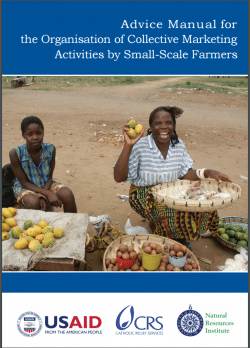
Policy highlights:
- Smallholder farmers would greatly benefit from working together more intensively by using group marketing strategies. Service providers (SPs) should take up the task to promote and facilitate this collective marketing.
- Recommendations for SPs include: 1) invest time in carefully explaining to farmers how collective marketing works and how it might benefit them; 2) carry out a feasibility study, for instance assessing production potential, to properly inform farmers of prospects; 3) train farmers in marketing skills and effective cooperation strategies.
- Farmers should be encouraged to organise their coordinated collective action through group meetings and brainstorming sessions initiated by SPs. A vital part of this process is constant evaluation and, where necessary, redirection.
- Key elements for making collective associations a success are: acquiring access to market information, e.g. through media, mobile phones and market information services; establishing linkages and build relationships with key actors, including government agencies, suppliers, transport and trading companies, and the farmers union; and setting up a transparent system of record-keeping, including a collective savings scheme for future investments








